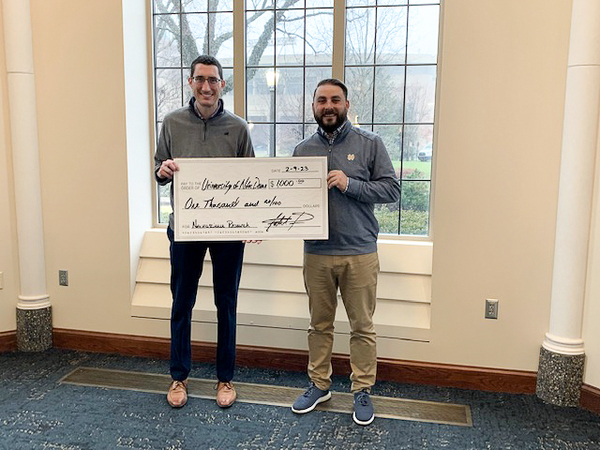
Caleb Fairchild recalls that when he was a child, his mother was sometimes sick, but he didn’t fully understand the reasons until he got older: She had been dealing with the effects of multiple sclerosis most of her life, with a diagnosis by age 16.
Mary (Garner) Fairchild-Lenyo, of Plymouth, Indiana, died at 51 from complications of her disease in 2015 and fought until the end, he said. Wanting to honor his mother and her fighting spirit, Fairchild has partnered with the University of Notre Dame to set up the Mary Garner Memorial Fund for Neuroscience Research. The fund will help support research done in the labs of Cody Smith, Elizabeth and Michael Gallagher Associate Professor, and Katrina Adams, Gallagher Assistant Professor, both in the Department of Biological Sciences.

“At first, I thought I was going to donate to multiple sclerosis organizations, but there’s no South Bend or Indiana-specific chapter of the National Multiple Sclerosis Society,” said Fairchild, who had been setting aside part of his commissions from his work in the auto sales industry to donate.
After doing some more brainstorming, Fairchild reached out to a friend whose family has a foundation that donates to Notre Dame, seeking advice on how to start his own. After an Internet search, Fairchild learned about research by Smith, who studies basic cell biology that could impact neurodegenerative diseases. Although Smith’s work isn’t specific to multiple sclerosis, it looked to Fairchild like it might be similar in nature. Smith confirmed the research could someday be a possible game changer for multiple sclerosis research.
Smith’s lab studies how stem cells and other cell populations build and rebuild the nervous system. Using advanced imaging approaches with molecular and cellular biology techniques, he and collaborators have revealed new developments in how the nervous system is built and can regenerate.
“Cody was very careful in making sure I knew he is not trying to cure multiple sclerosis, but that this is fundamental, foundational research they’re doing,” he said.
Fairchild worked with Adam Mason, his manager at Metz Auto Group, to drum up interest among other salespeople to voluntarily donate part of their commissions to aid the research. Metz Auto Group owner Jason Metz was also on board, and has decided the company will match donations, Fairchild said.
Smith said he was honored that Fairchild would reach out to him as he considered ways to donate.
“I greatly appreciate Caleb's trust that our basic research approach can make a meaningful impact in neuroscience and the diseases that affect the nervous system,” Smith said.
Fairchild is excited about the possibilities to inform the public about multiple sclerosis and the need for more research in the neuroscience field.
“The financial aspects of it are one part, but I really want the awareness to be the other part,” he said. “The more people I’ve talked to, the more there seems to be a misunderstanding about the early warning signs for the disease. You have a certain amount of denial in the early phases, but then you know something’s not functioning correctly.
“You know your body better than anyone, but at the same time you’re the first person to go, no, no, this isn’t a big deal. I’m just tired, or whatever. And sometimes if you catch the symptoms early, you can have a better outcome.”
That’s why, in addition to the contributions to the fund, Fairchild has kicked off a media campaign to get the ball rolling. He’s been speaking with different media personalities in the area, and created a video that talks about the fund and the collaboration with Notre Dame.
Fairchild worked with Allison Slabaugh, academic advancement director in the College of Science, to structure the fund, and presented the first $1,000 check to the fund in February.
Not only does Fairchild look forward to watching the fund grow and the project to expand, Smith is also grateful for the partnership.
“I think this partnership goes beyond the fund because it allows us to articulate to the local public that high impact and cutting edge basic neuroscience research is being done in the Northern Indiana backyard,” Smith said. “We hope this will grow into a project that the larger community will want to be involved in.”
Originally published by at science.nd.edu on March 07, 2023.